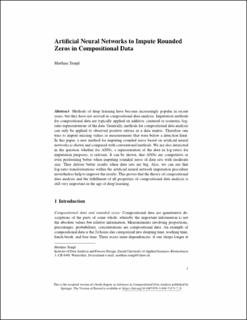Please use this identifier to cite or link to this item:
https://doi.org/10.21256/zhaw-24599Full metadata record
| DC Field | Value | Language |
|---|---|---|
| dc.contributor.author | Templ, Matthias | - |
| dc.date.accessioned | 2022-03-17T08:04:46Z | - |
| dc.date.available | 2022-03-17T08:04:46Z | - |
| dc.date.issued | 2021 | - |
| dc.identifier.isbn | 978-3-030-71174-0 | de_CH |
| dc.identifier.isbn | 978-3-030-71175-7 | de_CH |
| dc.identifier.uri | https://digitalcollection.zhaw.ch/handle/11475/24599 | - |
| dc.description.abstract | Methods of deep learning have become increasingly popular in recent years, but they have not arrived in compositional data analysis. Imputation methods for compositional data are typically applied on additive, centered, or isometric log-ratio representations of the data. Generally, methods for compositional data analysis can only be applied to observed positive entries in a data matrix. Therefore, one tries to impute missing values or measurements that were below a detection limit. In this paper, a new method for imputing rounded zeros based on artificial neural networks is shown and compared with conventional methods. We are also interested in the question whether for ANNs, a representation of the data in log-ratios for imputation purposes is relevant. It can be shown that ANNs are competitive or even performing better when imputing rounded zeros of data sets with moderate size. They deliver better results when data sets are big. Also, we can see that log-ratio transformations within the artificial neural network imputation procedure nevertheless help to improve the results. This proves that the theory of compositional data analysis and the fulfillment of all properties of compositional data analysis is still very important in the age of deep learning. | de_CH |
| dc.language.iso | en | de_CH |
| dc.publisher | Springer | de_CH |
| dc.relation.ispartof | Advances in Compositional Data Analysis : Festschrift in Honour of Vera Pawlowsky-Glahn | de_CH |
| dc.rights | Licence according to publishing contract | de_CH |
| dc.subject | Deep learning | de_CH |
| dc.subject | Compositional data analsysis | de_CH |
| dc.subject | Rounded zero | de_CH |
| dc.subject | Imputation | de_CH |
| dc.subject.ddc | 006: Spezielle Computerverfahren | de_CH |
| dc.title | Artificial neural networks to impute rounded zeros in compositional data | de_CH |
| dc.type | Buchbeitrag | de_CH |
| dcterms.type | Text | de_CH |
| zhaw.departement | School of Engineering | de_CH |
| zhaw.organisationalunit | Institut für Datenanalyse und Prozessdesign (IDP) | de_CH |
| zhaw.publisher.place | Cham | de_CH |
| dc.identifier.doi | 10.1007/978-3-030-71175-7_9 | de_CH |
| dc.identifier.doi | 10.21256/zhaw-24599 | - |
| zhaw.funding.eu | No | de_CH |
| zhaw.originated.zhaw | Yes | de_CH |
| zhaw.pages.end | 187 | de_CH |
| zhaw.pages.start | 163 | de_CH |
| zhaw.parentwork.editor | Filzmoser, Peter | - |
| zhaw.parentwork.editor | Hron, Karel | - |
| zhaw.parentwork.editor | Martín-Fernández, Josep Antoni | - |
| zhaw.parentwork.editor | Palarea-Albaladejo, Javier | - |
| zhaw.publication.status | acceptedVersion | de_CH |
| zhaw.embargo.end | 2022-06-02 | de_CH |
| zhaw.publication.review | Peer review (Publikation) | de_CH |
| zhaw.author.additional | No | de_CH |
| zhaw.display.portrait | Yes | de_CH |
| Appears in collections: | Publikationen School of Engineering | |
Files in This Item:
| File | Description | Size | Format | |
|---|---|---|---|---|
| 2021_Templ_DeepImpCoDa.pdf | Accepted Version | 305.1 kB | Adobe PDF |  View/Open |
Show simple item record
Templ, M. (2021). Artificial neural networks to impute rounded zeros in compositional data. In P. Filzmoser, K. Hron, J. A. Martín-Fernández, & J. Palarea-Albaladejo (Eds.), Advances in Compositional Data Analysis : Festschrift in Honour of Vera Pawlowsky-Glahn (pp. 163–187). Springer. https://doi.org/10.1007/978-3-030-71175-7_9
Templ, M. (2021) ‘Artificial neural networks to impute rounded zeros in compositional data’, in P. Filzmoser et al. (eds) Advances in Compositional Data Analysis : Festschrift in Honour of Vera Pawlowsky-Glahn. Cham: Springer, pp. 163–187. Available at: https://doi.org/10.1007/978-3-030-71175-7_9.
M. Templ, “Artificial neural networks to impute rounded zeros in compositional data,” in Advances in Compositional Data Analysis : Festschrift in Honour of Vera Pawlowsky-Glahn, P. Filzmoser, K. Hron, J. A. Martín-Fernández, and J. Palarea-Albaladejo, Eds. Cham: Springer, 2021, pp. 163–187. doi: 10.1007/978-3-030-71175-7_9.
TEMPL, Matthias, 2021. Artificial neural networks to impute rounded zeros in compositional data. In: Peter FILZMOSER, Karel HRON, Josep Antoni MARTÍN-FERNÁNDEZ und Javier PALAREA-ALBALADEJO (Hrsg.), Advances in Compositional Data Analysis : Festschrift in Honour of Vera Pawlowsky-Glahn. Cham: Springer. S. 163–187. ISBN 978-3-030-71174-0
Templ, Matthias. 2021. “Artificial Neural Networks to Impute Rounded Zeros in Compositional Data.” In Advances in Compositional Data Analysis : Festschrift in Honour of Vera Pawlowsky-Glahn, edited by Peter Filzmoser, Karel Hron, Josep Antoni Martín-Fernández, and Javier Palarea-Albaladejo, 163–87. Cham: Springer. https://doi.org/10.1007/978-3-030-71175-7_9.
Templ, Matthias. “Artificial Neural Networks to Impute Rounded Zeros in Compositional Data.” Advances in Compositional Data Analysis : Festschrift in Honour of Vera Pawlowsky-Glahn, edited by Peter Filzmoser et al., Springer, 2021, pp. 163–87, https://doi.org/10.1007/978-3-030-71175-7_9.
Items in DSpace are protected by copyright, with all rights reserved, unless otherwise indicated.